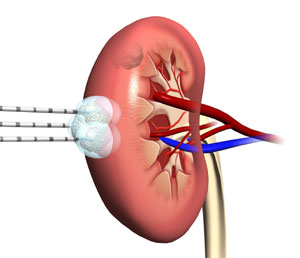
|
|
Ablative Kidney Cancer Services
Many types of cancer, including kidney, liver, lung and prostate carcinomas, can be destroyed—ablated—where they exist in the body. The cancerous tissue can be eradicated using cold energy (cryoablation) or heat energy (radiofrequency ablation). Delivered through the skin, or percutaneously, both methods are the least invasive technologies approved by the U.S. Food and Drug Administration to treat kidney tumors. Although the physicians at the UC Irvine Health Ablative Oncology Center use both methods, most kidney cancer specialists increasingly regard percutaneous cryoablation as a safer, more effective technology.

What is percutaneous cryoablation?
In percutaneous cryoablation, no incisions are made. Instead, specially trained physicians work together to insert thin, needle-
like probes through the skin and into the tumor. Specialists,
using advanced imaging technologies, precisely target and
destroy the tumor without damaging surrounding tissues and organs. This technique helps avoid larger incisions that are associated with cryoablation during traditional open surgery,
and it is substantially less invasive than robot-assisted or laparoscopic surgery.
How does cryoablation work?
Depending on the tumor's size, one or more probes are inserted into the tumor. Pressurized argon gas is delivered to a small chamber at the needle's tip, where it expands into an ice ball
cooled to minus 100 degrees Celsius. The ice ball engulfs the tumor while sparing healthy kidney tissue. Ultrathin sensor needles also may be inserted at the tumor margins to monitor temperatures and ensure that all the cancerous tissue is destroyed.
Learn more about percutaneous cryoablation of kidney cancer ›
As one of the first multidisciplinary ablative oncology centers in the nation — and the only one in Orange County — the Ablative Oncology Center offers patients leading-edge therapies delivered by highly skilled teams of surgeons, nurses, technicians and other medical professionals at UC Irvine Medical Center. Because center physicians are actively engaged in research at Orange County's only university medical center, patients also have access to the innovative clinical trials before they are available to the general public. Learn more about UC Irvine Health clinical trials ›
For more information about ablative treatment of kidney cancer or to make an appointment, please call 714-456-7005.
Clinical Team
 |
Jaime Landman, MD Urologic oncologist |
|
Landman’s clinical interests include all aspects of minimally invasive urologic oncology, with special emphasis on kidney cancer and kidney stone disease. He has performed more than 2,000 advanced minimally invasive kidney procedures and he is dedicated to improving the techniques and technology associated with minimally invasive surgery. |
|
 |
Ralph V. Clayman, MD Urologist |
|
|
|
 |
Edward Uchio, MD Urologic oncologist |
|
|
|